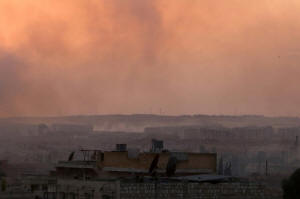|
'Road of death' to Aleppo pounded as air
strikes cut off rebel areas
 Send a link to a friend
Send a link to a friend
 [June 13, 2016]
By Tom Perry and Suleiman Al-Khalidi [June 13, 2016]
By Tom Perry and Suleiman Al-Khalidi
GAZIANTEP, Turkey/AMMAN (Reuters) - The
opposition-held sector of Syria's divided city of Aleppo has been cut
off from the outside world in recent days by an escalation of air and
artillery strikes on the only road in, putting hundreds of thousands of
people under effective siege.
A government campaign to fully capture Aleppo would most likely
bury what little hope remains of reviving a diplomatic effort to end
the five-year-old civil war, after talks and a ceasefire sponsored
by the United States and Russia fell apart earlier this year.
Aleppo, Syria's largest city before the war when it had more than 2
million people, has been divided for years into rebel and government
sectors, and capturing all of it has been one of President Bashar
al-Assad's biggest goals.
An estimated 350,000 people are still thought to live in the rebel
sector, in harsh conditions made worse by the latest attempt to
besiege them by cutting off the last remaining route out, the
Castello Road, named for Aleppo's old castle.
"The regime was not able to cut the road by land, so it has decided
to keep the planes in the sky continuously, hitting everything that
passes, regardless of what it is," said Zakaria Malahifji, senior
official in the Aleppo rebel group Fastaqim.
 "Whoever wants to go on the Castello road is undertaking a suicide
mission," he said. "It's been this way for 10 or 12 days. The
situation was difficult before - it was targeted and people were
crossing with difficulty - but now it is almost cut, nobody dares to
use it," he said, speaking at his group's office in the Turkish city
of Gaziantep near the Syrian border.
The international focus in Syria in recent weeks has partly turned
toward the conflict with Islamic State fighters, as both the
government and its enemies have made gains at the expense of the
ultra-hardline Islamist militants on several fronts.
But the separate hope of foreign powers -- that the wider civil war
could also be resolved -- has broken down, with Aleppo potentially
the biggest battlefield of all. Hundreds of people have been killed
there since peace talks broke off.
Assad vowed in a speech last week to recapture "every inch" of
Syria. Aleppo, he said, would be a "graveyard" for the ambitions of
his regional foe, Turkish President Tayyip Erdogan, who has backed
rebel groups.
A pro-Damascus source, who spoke on condition of anonymity, said the
reference was a signal of his intentions: "Why this threat? Because
there are preparations for something big in Aleppo."
Russia had intensified air strikes in agreement with the government
and its other allies to encircle rebels in the Aleppo area,
including in the city itself, said the source who is familiar with
the strategy.
So far, pro-government ground forces, aided by Iranian and Lebanese
Shi'ite militias, have been unable to complete the encirclement of
Aleppo by capturing a narrow corridor of territory through which the
Castello Road passes.
The highway had long been under sniper fire, but attacks from the
air and artillery sharply increased less than two weeks ago, with
more planes flying and new rockets and guns moved into range.
"Castello is the road to death to Aleppo. I did not know whether I
would make it to Aleppo city alive," said Mohamad Adeeb, an
opposition activist who drove the road on Friday.
[to top of second column] |

Smoke rises after airstrikes on Aleppo's Castello road, Syria June
2, 2016. REUTERS/Abdalrhman Ismail/File Photo

"I saw death with my own eyes, with corpses lying on the way and
dozens of trucks and civilian cars and bodies that none of the civil
defense teams were able to recover because of the intensity of the
shelling of the regime and Russian warplanes."
Inside Aleppo, the new pressure on the road has driven up prices of
goods, adding to the suffering of those still there.
"PREPARATIONS FOR SOMETHING BIG"
Russia said last week its air force would provide "the most active"
support to prevent Aleppo and the surrounding area falling into the
hands of what it called terrorists, a word Moscow and Damascus use
to describe an array of Assad's enemies.
Rebels have seen Russian statements that the al Qaeda-linked Nusra
Front has mounted attacks in Aleppo as a sign Moscow is looking for
new pretexts to attack: while Nusra has been active south of Aleppo,
the more moderate rebels say it has no presence in the city itself.
The Nusra Front, like Islamic State, was excluded from the ceasefire
and peace talks that were sponsored by Washington and Moscow.
The nationalist rebels fighting Assad in Aleppo are confident of
their ability to repel ground attacks in which Shi'ite militias from
Iran, Afghanistan, and Lebanon's Hezbollah have played a major role
supporting the government.
A number of these rebel groups receive foreign military support from
states opposed to Assad, funneled via Turkey. The rebels say they
saw off three attacks by pro-government forces in less than a month
on Handarat, also near the Castello road.
"The regime is trying to advance on the ground. It takes a point or
two, then loses them," said Abu Yassine, head of the Levant Front
rebel group, speaking to Reuters.
"These circumstances are not new to the fighters. They have thrown
all types of bombs at them and they can cope. The negative impact is
on the civilians," he said.
The Syrian Observatory for Human Rights says more than 300 people
have been killed in air strikes and government bombardment of
rebel-held Aleppo since April and around 250 people living in
government-held areas have been killed in the same period in
intensified rebel shelling.

Opposition sources say the toll is much higher, with dozens of
people currently being killed each day in eastern Aleppo, one of the
bloodiest spells it has suffered in the conflict. Civil defense
emergency workers operating in rebel-held areas say more than 450
people were killed there in the last month.
"It is a difficult and dangerous period we are going through. Aleppo
is almost under siege," Abu Yassine said.
(Additional reporting by Laila Bassam in Beirut; writing by Tom
Perry; editing by Peter Graff)
[© 2016 Thomson Reuters. All rights
reserved.]
Copyright 2016 Reuters. All rights reserved. This material may not be published,
broadcast, rewritten or redistributed. |